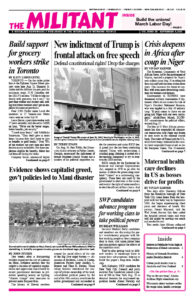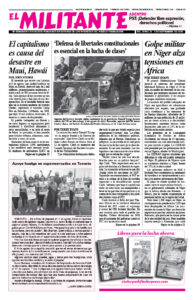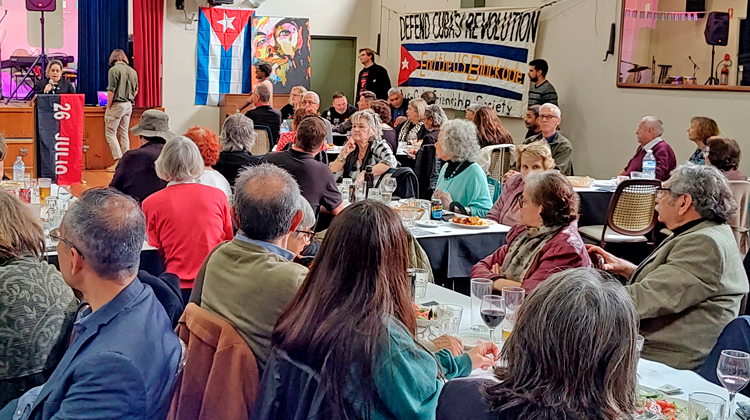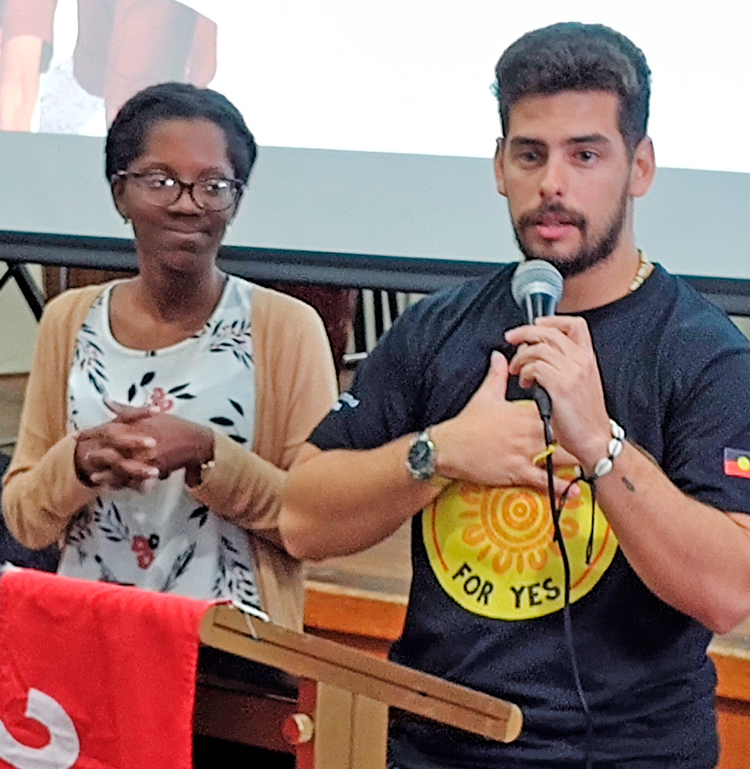SYDNEY — Marianniz Díaz Hernández and Iván Barreto López, leaders of the Union of Young Communists (UJC) in Cuba, visited Australia and New Zealand July 25 to Aug. 16 to speak about the challenges Cuban workers and farmers face and to build solidarity with Cuba’s socialist revolution.
Díaz is a research scientist who worked on trials of the successful COVID vaccines developed in Cuba. Barreto works in the Institute for Friendship with the Peoples department for the Pacific-Asia region.
Their tour to Auckland, New Zealand, and Brisbane, Melbourne, Adelaide, Perth and Sydney, Australia was hosted by the Cuba Friendship Societies in both countries.
In addition to public forums, meetings were organized with trade unions. “Our people stand in solidarity with the working class in Australia and continue to strengthen bonds with trade unions,” Barreto told a meeting of the Maritime Union of Australia in Sydney.
They were the featured speakers at an event of 100 here to celebrate the 70th anniversary of the attack on the U.S.-backed Fulgencio Batista dictatorship’s Moncada army garrison in Santiago de Cuba.
Tanieris Diéguez, Cuba’s ambassador to Australia, also spoke. “We are commemorating a critical event in our history,” she said. The Moncada assault “became the spark of a movement of struggle that resulted in the 1959 victory” of the revolution. “We commemorate those who lost their lives and pay tribute to the outstanding role of Fidel Castro.”
Barreto outlined the history of the over 60-year U.S. economic war on Cuba. Various U.S. administrations “have changed tactics but not their purpose,” which is to bring down the revolution. “Right from the beginning of the revolution,” he said, “during the literacy campaign and the agrarian reform, U.S. sanctions were imposed on Cuba.”
Washington “recognized that the majority of Cubans supported Castro,” he said. To try to change that they moved “to create difficult economic conditions inside Cuba and to isolate it internationally.” That is why “international solidarity condemning the blockade and actions of support” are important.
Díaz described how, despite U.S. economic pressure, Cuba vaccinated almost the entire population against COVID. “We did this through working together and mobilizing the whole of society.”
Students and communist youth volunteered to provide free meals and medicine for those in isolation in special centers, Barreto said. “I was a volunteer in one of the centers,” he said. “For young people, it was our Moncada. It was a way to contribute.”
Asked if there was opposition to getting vaccinated, Diéguez said that in Cuba “people trust the government in its health decisions, which stems from 60 years of popular revolution and of education.”
Young people led the voluntary effort, but also many of Cuba’s mass organizations were involved, she said. “The population was unified in face of the pandemic and the process of vaccination.”
The two Cuban youth also addressed a meeting of 35 at Sydney University Aug. 7.
Cuba has one of the highest vaccination rates in the world and was “the first country to vaccinate children from the age of 2,” Díaz said. As a result, COVID infections in the population had gone from very high initially to among the lowest in the world.
The development of COVID vaccines was possible because the Cuban government has prioritized the funding of biotechnology research for more than three decades, she said. Cuba’s COVID vaccines have been made available to many countries, often for free.
Asked how the measures against COVID were able to be implemented in isolated rural communities, they said this was because health services already existed there.
Others asked if there is growing inequality in Cuba, is there declining support for the revolution, what are the principles that guide Cuba today, what lies ahead?
“Cuba is facing very big challenges right now,” said Barreto, made worse by Washington’s economic war. “Some say that communism has been a failure in Cuba,” a view found “mainly among young people.”
Many young people “don’t know what Cuba was like before the revolution,” he said.
Cuba is not communist, he added. “We are struggling for socialism as a stage toward communism.” Working people made great gains through the revolution, he said, for example, access to housing.
“Revolution is not made in an instant,” he said. “The Cuban Revolution is an ongoing struggle to advance.” And this has been aided because “we have had international support since the beginning.”
Barreto also described how Cuba had welcomed and treated over 20,000 children and others from Ukraine following the 1986 Chernobyl nuclear meltdown there. “Cuba has always extended international solidarity.”



